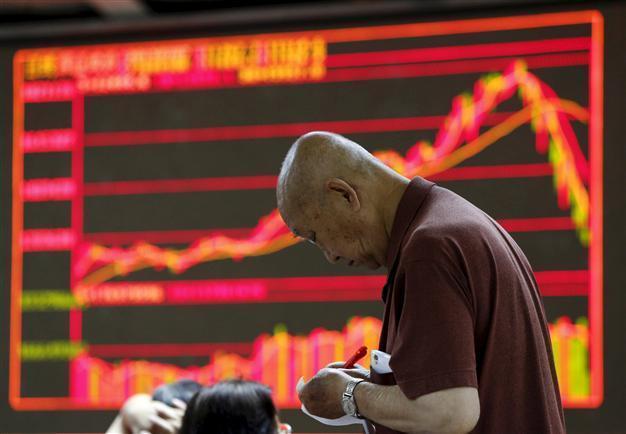China stocks sink again despite government efforts
SHANGHAI - Agence France-Presse

An investor takes notes in front of an electronic board showing stock information at a brokerage office in Beijing, China, July 7, 2015. Reuters Photo
Chinese shares took another tumble on July 6, defying government efforts to arrest a precipitous fall that has wiped an estimated $3.2 trillion off markets and threatens the world’s number-two economy.
The government over the weekend announced a halt to initial public offerings (IPOs) and moves to pour funds into the market to end three weeks of plunging prices.
Analysts say the heavy-handed intervention throws into question the pace of China’s economic reforms and the ability of the government to deflate what many describe as a stock market bubble.
The benchmark Shanghai Composite Index fell 1.29 percent, or 48.79 points, to end at 3,727.12 on turnover of 776.1 billion yuan ($126.9 billion). It was down as much as 5.05 percent during the day.
The Shenzhen Composite Index, which tracks stocks on China’s second exchange, slumped 5.34 percent, or 109.02 points, to 1,932.83 on thin turnover of 301.4 billion yuan.
“The slumping Chinese stock market has raised concerns of systemic risks,” ANZ Banking Group said in a research note on July 6.
When the Communist Party launched a stock market, the ultimate capitalist tool, 25 years ago it kept strict control over key decisions, including which companies can list and who could invest.
Under the administration of President Xi Jinping, policymakers unleashed a liquidity surge and state media urged the market forward, seeking a boost for a slowing economy and populist cheer among investors for their growing fortunes.
Over 12 months Shanghai soared more than 150 percent. But Communist planners are now facing the challenge of trying to prevent a market crash that could spark social unrest from disgruntled investors and infect the larger economy.
“China’s leadership has doubled down on its efforts to prop up equity prices because it believes that its own credibility is now coupled to continued gains on the markets,” Mark Williams, chief Asia economist for Capital Economics, said in a research report yesterday.
“It is following a risky path.”
